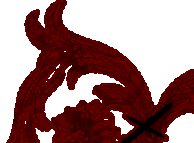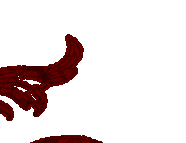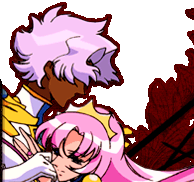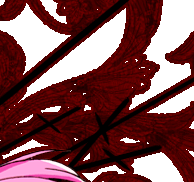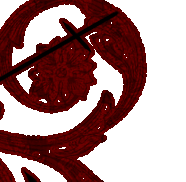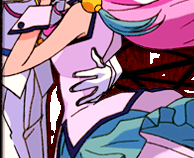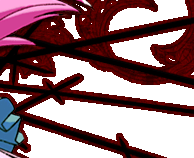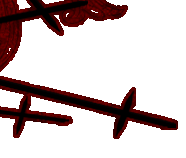
Cosmopolitan Designs in Salman Rushdie's 'The Enchantress of Florence'
and Hermann Hesse's 'Demian'
(Including an excursus on Kunihiko Ikuhara's anime-series 'Revolutionary Girl Utena')
This analysis
was donated by Meike Nederveld.  2 Examples of Cosmopolitanism In this chapter I will discuss the various versions of cosmopolitanism lived by the
most notable characters in Enchantress, taking note of what drives their choices
(if there are choices), how they influence the course of the novel, and how the
situations in which they find themselves relate to cosmopolitanism. Then I will
outline the form and nature of the cosmopolitan characters in Hesse.
 2.1 "People, places, narratives, possibilities of lands yet unknown" 3 - Rushdie's
The Enchantress of Florence
Qara Köz
Qara Köz is the youngest and “most beautiful” (P. 109) princess of the Mughal
empire, the daughter of a concubine. She taken captive by Shaibani Khan, and is,
from this point on, uprooted. In her exile, she is accompanied by her Sister
Khanzada, and her slave girl, “the mirror”, who is inseperable from her. When
they are freed by Shah ismail, and her sister returns home, she chooses to remain,
along with the mirror, in a confident act of will: “Qara Köz shook off her sister's
hand, threw off her veil, and looked the young king right in the face. 'I would like
to stay,' she said” (P.215). She has a choice: to return to a home she has not seen
for years of her young life of seventeen years, to be a daughter and a younger
sister again, or to stay and become the prince's consort. Her gesture of unveiling
is one of submission to a new master, and simultaneously, of defiance, already
hinting that if she can so easily discard the status of daughter, she can unsettle
male dominance, but such is the price of having her. Consequently, when he has
lost her, Ismail identifies her as a sorceress (P. 215) – a witch. This scene is later
mirrored when Mogor tells Akbar that when arriving in Florence, “no one
ordered Qara Köz to bare her face [...] she freely made her own decision.” (P.
238), the cue at which Akbar falls in love with her.
While with Ismail, Qara Köz is described as extremely self-indulgent, her
existence like an orgiastic dream filled with soft carpets, food, games, sapphic
“play” and other eroticism, music, and the ambiguous hint at barrenness (P. 217),
in its promise of perpetual eroticism without the unerotic consequence of
childbirth a virtue for a whore, but the doom of a lady. She also has a tendency
towards megalomania, a feature she sees mirrored in Ismail, which makes him
attractive to her, but also suggests that she will abandon him, should he be
humbled.
With the arrival of Argalia and the defeat of Ismail, she changes allegiance again,
as she encounters in him her mirror image, a creature of magic like herself, and
they are enchanted with each other. With Argalia, she begins her journey west. At
first, he doubts her loyalty, suspecting that she will only use him as a means: “a
horse is only a horse, after all” (P. 224), but Qara Köz offers him the use of her
powers in return. In including the mirror into their relationship, something she
had not done with Ismail, she offers him all of her, because the nature of the
mirror is that of her extended self. She is more beautiful and powerful and
desirable than any one woman “ought to” be, so by mirroring her, Rushdie makes
the superlative of her tangible. Argalia gives her (them) the Italian name
“Angelica”, and they reside in the Ottoman Sultan's court in Istanbul, at the very
border of Europe.
When Argalia falls from grace at court they flee, and travel back to Italy by ship.
Qara Köz and the mirror discard their veils completely, doing, as the proverb
says “as Romans do”4
for a time live at Il Machia's home outside of Florence. Qara Köz has instantly
and completely mastered the language, and seems to have a better understanding
of the local flora, too, as she and the mirror find a whole bed of mandrakes,
where the locals could not.
. They travel to Argalia's “home”, retracing his steps, and
Qara Köz' arrival at Florence is already anticipated by her appearance in a magic
mirror, and thus her coming to the city is almost like a homecoming. As before,
the mirror and her grasp on the local culture goes deeper than that of the locals,
as they take to living their lives outside, in contrast to the customs of their
cultural origin, but in doing so become an inspiration for local noblewomen to do
the same. Still, her perpetual exile distresses her:
[...] she was without family, without clan, without any of the consolations of
remaining within one's allotted frontiers, inside her mother tongue and in her brother's
care. It was as if she were [...] willing herself to fly, while fearing that at any
moment, the spell might be broken and she would plummet to her death. (P. 257)
Finally, Qara Köz even rises to the status of a saint, but she soon exhausts her
powers of enchantment, and her image changes. At the end of Chapter 17, she is
referred to as a “Saracen whore” – an expression not only diminishing her status,
but also denouncing her as a cultural other.
The flight of Qara Köz and the mirror is the death of the Angelicas, and Argalia
dies as well, defending them. Ago Vespucci travels with them to “Mundus
Novus”. Masquerading as men for the journey, they cross the border of gender,
and the border of the old world. Since the way east is the way of defeat, the
wrong direction of history in a narrative sense (Persian, Chaghatai and Urdu are
all written right-to-left) and offers only scorched earth to Qara Köz due to her
past alliances, but all the same she longs for home. She rests her hopes on the
widespread idea that India lies close behind the newly discovered lands. She is
wrong, of course, and enters a world beyond history, time and language, the
absurdity of exile. She has brought death with her, “sitting on her shoulder like a
falcon”(P. 335), and when a falcon comes to her [mirror's daughter] on her
deathbed, it takes her soul with it (P.336). Yet, on the wings of falcons she is
borne back to India after all, as her [not] son, going by the pseudonym of
“Uccello” on the ship of lord Hauksbank, carrying a live falcon with him, arrives
in India to tell her story, planting the idea of her in the head of another magician
who can bring her back to life, thus completing her last enchantment, Qara Köz
succeeding in failure.5
Argalia
Antonino Argalia's parents die when he is a little boy. His uprooting his exile
from a home that is whole. When his friends Il Machia and Ago show him the
mandrake root they found, he states that “that sort of thing doesn't interest me
any more. [...] I'm running away to Genua [...]”(P. 138). He has lost all interest in
(his) roots, and is, by loss, transformed into a grown man. Thus the narrative
proposes that growing up is a universal exile – from childhood. In Argalia,
however, this exile awakens a sense of destiny, and his prophetic descriptions of
his future endeavors (P. 139) will come true, in the end.
Argalia joins Andrea Doria's condottiere, first as a stowaway, then as a teller of
tales aboard Doria's ship. In a conversation with Doria, who sees the world
governed by the “orphan's law”, that the end justifies the means, he suggests that
a common nature as orphans should in fact unite them with their enemies, and
recognizes himself in the Other for the first time, as he shares his orphan status
with the “Prophet of Islam” (P. 172). This passage hints at the ambiguous nature
of cosmopolitan existence. On the one hand, the universal nature of humans to
seek their own profit to ensure their survival, more so if they are deprived of the
security of familial and social attachments, and on the other hand, the
(theoretical) possibility of compassion arising out of similarities across cultural
and national borders, of international alliances.
When they clash with the Ottoman navy, Doria puts Argalia in a boat and
abandons him, as a ruse to facilitate his own escape. In the thick fog, Argalia
encounters the absurdity of absolute exile:
This was what was left of a human individual when you took away his home, his
family, his friends, his city, his country, his world: a being without context, whose past
had faded, whose future was bleak, an entity stripped of name, of meaning, of the
whole of life except for a temporarily beating heart. 'I am absurd,' he told himself.
(P. 175)
When he later meets Qara Köz, he realizes that she has gone through the same
process of complete uprooting.
Argalia is captured by the Ottomans and trained as a Janissary slave warrior. His
conversion to Islam is described as a superficial change6
ranks to chief falconer7
Prince Vlad the Impaler of Wallachia, the infamous Vampire Dracula.8
Argalia's introduction in the novel is actually preceded by the introduction of
another Vampire: the beautiful Simonetta raised from the dead (P. 137). The
insistence of descriptions of Argalia as a pale, androgynous man of otherworldly
beauty (P. 218), with blood-red lips, or as a personification of death, and
attributes like „Blood, and its shedding, had been his life's concern“ (P. 219)
connotates him further with vampirism. I would not argue that he IS a vampire in
the classical sense, but that his own powers of enchantment are indeed a
manifestation of a vampiristic quality in his character, maybe having „rubbed
off“ at his encounter with Dracula. This can be read as another level of exile, as Il
Machia notes: “he was a dead dog now, as dead as poor Ago, for they had both
been dismissed from life, from their jobs [...]” (P. 242), and yet, as Ago puts it:
“the living dead can still feel the pain of a broken heart” (P. 242).
Before he wins Qara Köz from the Shah, Argalia is re-introduced as the above-
mentioned beautiful creature, notably in terms of queerness, a “female self within
the male” (P. 219), and when they meet, she recognizes is features as female,
“like a tall, pale, black-haired woman who had glutted herself on death”, but also
his other side: “he was both things, swordsman and shootist, male and female,
himself and his shadow as well”. As they exchange their first words, one could
add: Indo-European and Turkic, which is true for her as well, and they form their
alliance on a mutual assertion of the other's language.
Argalia's perpetual exile is stressed as his position at the sultan's court changes:
“But home was always a troubled, dangerous idea for men like Argalia to allow
themselves to believe in. It could catch at them like a noose” (P. 225). It would be
too easy to identify his role as an outsider as the source of this position when In
fact, it mirrors Il Machia's expulsion from Florentine politics. Both command
their own militias, and both are seen as “probable, and dangerous, rival[s] for
power”, in Argalia's case because “a man capable of murdering the vizier was
also capable of regicide” (P. 225).
He returns to Italy like a Prince, on the doorstep of Andrea Doria's, who cautions
him: “You haven't stopped being a child, [...] You still think that home, at the end
of a long journey, is a place where a man finds peace” (P. 231). Like Qara Köz,
Argalia cannot escape exile. He is welcomed and employed in Florence as a
military commander, at the cost of distancing himself from his Friends, but once
again is betrayed when a new ruler comes into power. The love between him and
Qara Köz has gradually faded, but he returns to her one last time, to save her,
10
before he dies, not a citizen of Florence, but as the last condottiere. (P. 302)
 2.1.2 Travelers, dreamers – Akbar, Il Machia and Princess Gulbadan
Akbar and Il Machia are both narrators and narratees within Enchantress, both
dreaming of forging an ideal state, and both travelers within their countries'
borders. Akbar is told the story of Qara Köz by Mogor, while Il Machia hears
Argalia's story from the Memory palace. They even inspire each other, as Il
Machia has a dream of Mogor and Akbar (P. 189), and later Akbar traces
thoughts from Machiavelli's Il Principe (P. 326). They both invite magical
strangers into their homes, and both see magic leaving them forever, when they
go. In their hospitality and openness, they can be seen as a passively
cosmopolitan alternative to exile, though neither of them is free of their own way
of exile, as Il Machia falls from grace and is cast out of Florence, and Akbar is
driven out of Sikri, and never comes to terms with the first person singular,
remains in exile from the self. Akbar is, however, a magician of the mind –
something Il Machia tries to be, but fails, as he accidentally destroys, instead of
frees, Angelique, the Memory Palace – and can create life from thought, and
travel time and space (P. 141). His creation Jodha accounts his magical powers to
his lineage; his family's roots in the black arts (P. 47).
His aunt Gulbadan, of the same line as himself, is a traveler as well. She has gone
on, and now organizes for other women, the pilgrimage of the Hajj. To some, like
Akbar's Mother Hamida Bano, the thought of a woman embarking on the Hajj is
shocking, and when Gulbadan returns changed, less rigid, questioning
conventions, and an advocate of women's rights, her behavior is a scandal, but
she is loved for it, and even seems to, as a result, be more attractive, even
physically. Her character is clearly informed by the notion that “cosmopolitanism
is sexy”, that travel, and expanding ones horizon in the literal sense improves the
self. At the same time, she, as Il Machia and Akbar, remains rooted in her own
local and cultural context, and all of them use their local knowledge to their own,
or other people's, advance.
 2.1.3 The Cosmopolitan
Mogor dell'Amore, or Niccoló AntoninoVespucci (P. 335), is a different matter
altogether. He is neither an exile, nor locally bound, born of a relationship of
ultimate internationality (east/west) and ultimate particularism (incest) (Cf.
Anderson Sasser 126) in a place where neither of his parents is rooted. At the
same time, he is fluent in every language, highly skilled and educated already,
and a quick learner (P. 313). His cloak of leather lozenges, a fool's cloak, mirrors
Akbar's cloak of space and time, and within it, he carries all manner of things. He
also allegedly carries his lover, the whore skeleton, from a brothel in Sikri into
the story he tells (P.153), but more than that, he carries the idea of Qara Köz into
Sikri, sparking a new interest of its citizens in their own past, and enabling her to
return home. In turn, he expects to be granted a home in Sikri, but his status is
not safe, because he is accused of lying, and unable to offer proof, and finally he
is denied his place. As a consequence, the lake below the city runs dry, and all its
citizens are driven into exile, robbed of their future like the citizens of Hamelin
are robbed of their children by the Piper. Akbar interprets the drought as a curse
for wronging an innocent man, but in the very first chapter, making water
disappear is introduced as a trick of Mogor's repertoire:
Once at home in Florence he had met a man who could make water disappear. [...] It
was a trick, of course, and before the day was done he, the traveler, had coaxed the
fellow's secret out of him, and had hidden it among his own mysteries. (P. 8)
Mogor is hardly innocent, as his murder of Lord Hauksbank early in the novel
exemplifies, but the trickery he employs can turn into, and inspire, real magic, as
with his arrival strange things happen, like the the painter Dashwanth vanishing
into his painting, and a singer spontaneously bursting into flame. All this hints at
an authenticity of his lineage, not by blood, but by another sort of bond. His
given names incorporate all of the three friends from Florence, his role as adviser
to the emperor mirrors that of Il Machia, his looks those of Ago, and his
androgyny and charisma that of Argalia. In the same way, his mother is either
Qara Köz, the mirror, the daughter of either of them, or all three together. The
character of Mogor is not just a cosmopolitan character, but in itself a challenge
to conservative, singular modes of belonging. His not having one single father
mirrors his not having a single fatherland, having more than one mother, he also
has more than one mother tongue. This particular cosmopolitan mode of
belonging is not simply descriptive, but also prescriptive, as Anderson Sasser
would have it, as not only is the reader invited to identify with him, but he is also
the only one who escapes with a happy ending, having found love in Skeleton,
the whore.
 2.2 “Heim kommt man nie, aber wo befreundete Wege zusammenlaufen, da sieht
die ganze Welt für eine Stunde wie Heimat aus” 9
- Hesse's Demian
The above sentence is uttered by Frau Eva, as she welcomes Sinclair into her
home. Her home, however, is also his home, since the arch under which she
appears is adorned with the drawing he himself made, modeled on the relief
above the entrance to his parents' home, and her character is already charged with
connotations of (incestuous) motherhood. She is at once mother, lover and whore
(and devil, vampire and murderer) (Cf. Hesse 113), an ambiguous figure
seemingly created from within Sinclair himself. Before he is led before her, he is
reunited with her son, his childhood friend Demian, who accompanies a Japanese
man through the streets of the university-city of H(eidelberg)(?), and, following
them, overhears the following statement:
Ist es nicht genau wie das Jungmännerhaus in einem Negerdorf? [...] Alles stimmt,
sogar das Tätowieren ist noch Mode. Sehen Sie, das ist das junge Europa. [...] Nun,
es wird bei Ihnen in Japan auch nicht besser sein. Die Leute, die nicht der Herde
nachlaufen, sind überall selten. Es gibt auch hier welche.
Demian thus draws parallels between all the cultures in the world. In his
interpretation, there are two kinds of people: the people who “follow the herd”,
and a select few who aspire to become “true humans”. Sinclairs temporary guide
Pistorius puts it this way:
Sie werden doch wohl nicht alle Zweibeiner, die da auf der Straße laufen, für
Menschen halten, bloß weil sie aufrecht gehen [...]. Nun, in jedem von ihnen ist die
Möglichkeit zum Menschen da, aber erst, indem er sie ahnt, indem er sie sogar
teilweise bewusst macht, gehören diese Möglichkeiten ihm.
When Sinclair meets the other friends of Frau Eva, he outlines their group in the
following terms:
Und doch lebten wir keineswegs von der Welt abgeschlossen, wir lebten in
Gedanken und Gesprächen oft mitten in ihr, nur auf einem anderen Felde., waren
von der Mehrzahl der Menschen nicht durch Grenzen getrennt, sondern nur durch
eine andere Art des Sehens. Unsere Aufgabe war, in der Welt eine Insel darzustellen,
vielleicht ein Vorbild, jedenfalls aber die Ankündigung einer anderen Möglichkeit zu
leben. (P. 169)
Taking into account that the group also probably contains people of various
countries, as the presence of the Japanese man suggests, of different cultures and
religions, such as Buddhist missionaries, Kabbalists or Yogis (P. 168-169), and
that whenever the question of politics is raised, the talk is not of Germany, but of
Europe as a whole, this passage formulates a clearly cosmopolitan perspective,
including a moral dimension.
Among this cosmopolitan group, the people bearing “the mark” are special:
Wir, die mit dem Zeichen, mochten mit Recht der Welt für seltsam, ja für verrückt
und gefährlich gelten. Wir waren Erwachte, oder Erwachende, und unser Streben
ging auf ein immer vollkommeneres Wachsein, während das [...] der Anderen
darauf ging, ihre Meinungen, ihre Ideale und Pflichten, ihr Leben und Glück immer
Enger an das der Herde zu binden. (P. 169)
Sinclair identifies their group as an avant garde movement of humankind, an
experimental existence that does not rely on any form of attachment. Frau Eva
cautions him, when they first meet, that he will have to let go of her eventually.
This experimental existence is painful, as Sinclair admits in the final paragraph
of the novel: “Alles, was seither mit mir geschah, tat weh.” (P. 194), but his
reward is a meaningful existence, and true knowledge of the self and the world.
Go back to Index - Next Page

2 Namely David Gates' Review in the New York Times.
3 From Enchantress (Rushdie 317)
4 It is probably not a coincidence that half a page earlier, Andrea Doria likens his villa, the place
at which they land, to ancient rome. (P. 229)
5 The scene of her last enchantment has Andrea Doria liken her to Christ, but to the reader,
another connotation arises from his description: "Andrea Doria looked at the young woman in
her olive-green tunic and hose, her cropped black hair standing out from her head like a dark
halo, and was overcome". This could well be read as Joan of Arc, another saint who failed and
yet succeeded, in an oriental redesign, which would entail the interesting implication that the
mirroring titles of the "Virgin of Orléans" and "Enchantress of Florence" are intended.
6 Though the "new pair of pyjamas" of Islam paint a richer and more comfortable picture than
the "rags" of Christianity.
7 Another falcon. See also 9
8 Thus, when Qara Köz carries death "sitting on her shoulder like a falcon” into the new world,
this could be read as her dying because the “falconer of death” will not leave the world
without her.
9 From Demian (Page 164)
  |

